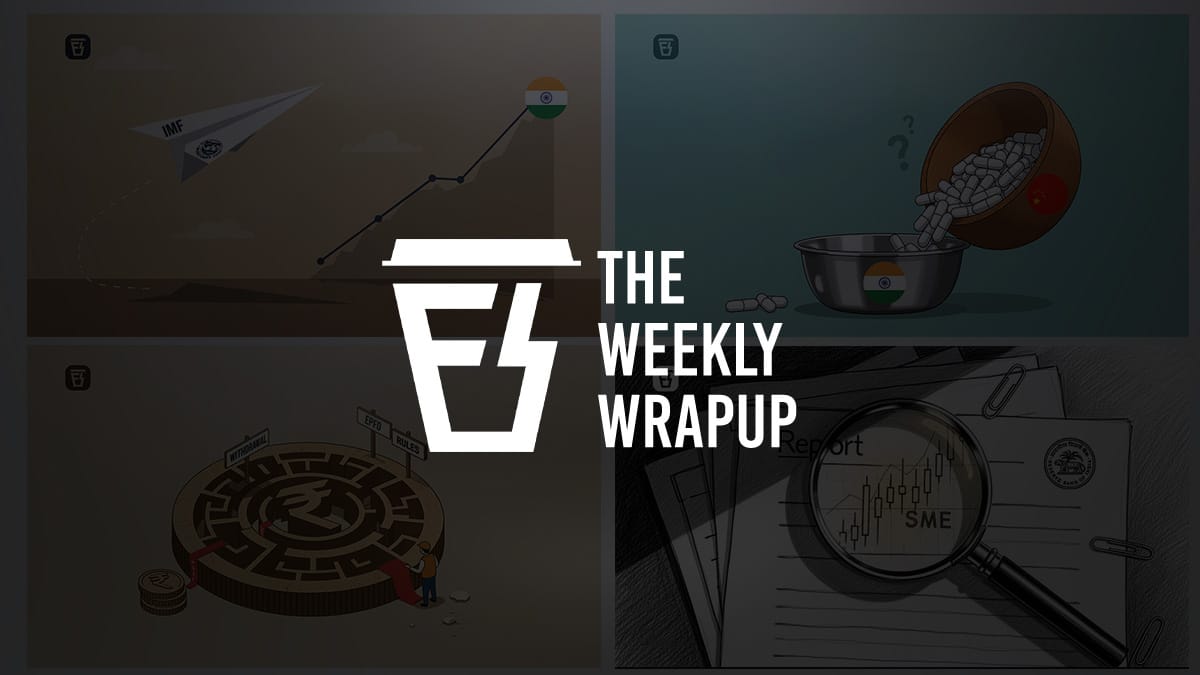RBI’s report on SME IPOs, IEX info leaks, India’s China drug dependence and more…

In this week’s wrap-up, we talk about the insider trading scandal that rocked India’s power regulator, the IMF’s 6.6% growth forecast for India and whether it actually holds water, the new EPFO withdrawal debate and why India’s mighty pharma industry still leans on China for its raw chemistry.
And in this week’s Markets edition, we broke down why the RBI is worried about the SME IPO frenzy, what’s fuelling it, why retail investors are flocking in and whether it’s becoming a bubble that could burst just as fast.
Click here to read the full markets story.
And with that out of the way, let’s take a look back at what we wrote this week.
The CERC-IEX insider trading saga explained
It’s not every day that an insider trading case begins inside a regulator’s office. But that’s exactly what happened when SEBI traced a series of suspicious trades in IEX stock options back to the Central Electricity Regulatory Commission (CERC) — the same body that drafted the marker coupling order which crashed IEX’s stock.
Turns out, officials from CERC’s economics division allegedly leaked the confidential order to friends and family before it became public. Those in the know bet against IEX by buying put options (essentially wagering that the stock would fall) and when it did, they collectively walked away with a staggering ₹173 crore in profits.
It’s a rare case where the rule-maker became the rule-breaker, showing just how quickly trust in a fair market can evaporate when information stops being equal.
Read our Tuesday’s story to know how the entire episode unfolded and what it means for market integrity.
Can India really grow at 6.6% like the IMF says?
The International Monetary Fund (IMF) recently raised India’s FY26 growth forecast slightly higher from 6.4% to 6.6%. That might not sound like much, but the upgrade came despite Trump’s 50% tariffs on Indian exports. In other words, the IMF still believes India’s momentum is strong enough to cushion global shocks.
But are these forecasts actually reliable?
Well, we dug into IMF forecasts and noticed a pattern. The Fund’s global projections often lean optimistic, especially around crises. Yet India seems to buck that trend. Thanks to better, faster data updates and a resilient domestic economy, the IMF’s India forecasts have historically been remarkably accurate.
Which again brought us back to the question - Is the 6.6% growth forecast optimism or realism?
Find out the answer in our Wednesday’s newsletter here.
What’s up with the new EPFO rules?
The EPFO’s proposed rules promise fewer forms and faster claims… but there’s a catch. For the first time, they’ll lock away 25% of your provident fund corpus until retirement. The idea is to stop people from dipping into their savings too early. But for many employees, it feels like the state is deciding when and how they can touch their own money.
The new framework merges 13 withdrawal clauses into just three: for essential needs, housing, and special circumstances. It allows access to both employer and employee contributions after just one year of service, but that final 25% stays out of reach as a so-called ‘retirement safeguard.’
The logic makes sense because Indians often retire with very little savings left. But the execution raises bigger questions about financial autonomy. If you earn it, fund it, and pay taxes on it, should you really need permission to use it?
You can read our take in Thursday’s story.
How reliant is the Indian pharma industry on China?
India may be the world’s pharmacy, but the chemistry behind it largely comes from China. Over 70% of the raw materials that go into our drug manufacturing — known as Active Pharmaceutical Ingredients (APIs) and Key Starting Materials (KSMs) — are imported from Chinese factories. And for some critical compounds, that number is close to 100%.
But this wasn’t always the case. India once made most of its APIs domestically, but as Chinese manufacturers scaled up with cheap power, raw materials, and integrated chemical parks, Indian plants slowly shut down.
And despite India’s new bulk drug parks and ₹7,000 crore in incentives, catching up won’t be that easy.
To know why, and what can India possibly do to overcome this, check out the full story in our Friday’s newsletter.
Liked this week’s wrap-up?
Don’t forget to hit share on WhatsApp, LinkedIn, and X.
A message to all the breadwinners
You work hard; you provide and make sacrifices so your family can live comfortably. But imagine when you're not around. Would your family be okay financially? That’s the peace of mind term insurance brings. If you want to learn more, book a FREE consultation with a Ditto advisor today.
